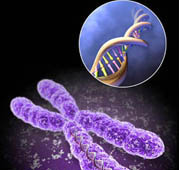Hereditary diseases depending on the defeat of hereditary structures are divided into gene, chromosomal and genomic mutations. Generic diseases arise as a result of gene mutations, and chromosomal diseases are determined by genomic and chromosomal mutations.
Content
The concept of hereditary diseases
Hereditary diseases, depending on the level of the organization of hereditary structures, gene, chromosomal and genomic mutations, and depending on the type of cells - gametic (sexual cell mutations) and somatic.
Hereditary diseases in the strict sense of the word are divided into two large groups - gene and chromosomal. Genesis - Diseases caused by genital mutations. Chromosomal diseases are determined by chromosomal and genomic mutations.
Division of hereditary diseases for these two groups is not formal. Gene mutations are transmitted from generation to generation in accordance with the laws of Mendel, while most chromosomal diseases are not inherited at all.
Diseases with hereditary predisposition
Diseases with hereditary predisposition can be monogenic (inherited one gene) and polygenic (inherited several genes). To implement them, not enough for the relevant genetic constitution of the individual - need another factor or complex of environmental factors, «Running» Formation of a mutant phenotype (or manifestation of the disease). With the help of environmental factors, hereditary predisposition is implemented.
Genetic diseases of somatic cells
 Genetic diseases of somatic cells are highlighted in a separate group of hereditary diseases. The reason for this was the detection of specific chromosomal rebuilding neoplasms in cells causing the activation of oncogenes (genes responsible for the development of cancer tumors). These changes in the genetic material of cells are the main factor for malignant growth and therefore can be classified as genetic pathology.
Genetic diseases of somatic cells are highlighted in a separate group of hereditary diseases. The reason for this was the detection of specific chromosomal rebuilding neoplasms in cells causing the activation of oncogenes (genes responsible for the development of cancer tumors). These changes in the genetic material of cells are the main factor for malignant growth and therefore can be classified as genetic pathology.
Today there are already the first evidence that outbreaks of congenital malformations are the result of mutations in somatic cells in the critical period of development of the fetus. Consequently, such cases can be considered as a genetic disease of somatic cells.
It is very likely that autoimmune processes and aging can be attributed to the same category of genetic pathology.
Diseases arising from the incompatibility of mother and fetus for antigens
Diseases arising from the incompatibility of the mother and fetus on antigens develop as a result of the immune response of the Mother to the antigens of the fetus. The blood of the fetus in a small amount falls into the body of a pregnant. If the fruit inherited from the father a positive rear factor, which is not in the mother, then the blood of Mother's rezes is negative, then the body is pregnant in the immune response. Mother's antibodies, penetrating the blood of the fetus, cause him immune conflict. The most typical and well-studied disease of this group is a hemolytic disease of newborns, resulting from the incompatibility of the blood of mother and fetus.
In general, this group is a significant part of the pathology and is often found in the practice of an obstetrician-gynecologist and in medical and genetic consultations.









